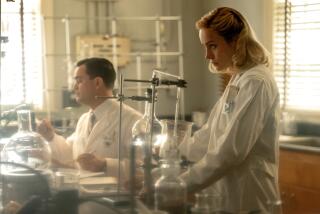Tragedy Is Rich Legacy of ‘Heiress’
Catherine Sloper, the center of William Wyler’s sensitive and enduring 1949 film, “The Heiress,” is the type of character that haunts you like the sight of a lost puppy searching futilely for home.
Catherine is surely one of cinema’s most memorable and heartbreaking doormats. She is a turn-of-the-century spinster and the sole heir to her father’s vast estate. But despite the best schooling, she is also bereft of the type of charm, grace and intelligence expected of a woman of her class. As her less-than-charitable surgeon-father points out, Catherine is a “mediocre and defenseless creature without a shred of poise.”
In a brilliant Academy Award-winning performance, Olivia de Havilland brings Catherine’s insecurities and childlike naivete to subtle life. When she falls for the wily Morris Townsend (Montgomery Clift), a handsome gold-digger, you want to tuck her under a protective wing.
Catherine is convinced that Morris loves her completely and unconditionally. But her father, Austin (Sir Ralph Richardson), is convinced he loves her solely for the $30,000 a year inheritance she’s due to collect upon his death. In the film’s most brutal scene, he callously tells his daughter the reasons why a man wouldn’t want to marry her.
Austin wants to protect Catherine. But he also views her with a contempt borne out of her inability to match her deceased mother’s beauty and sophistication. When Catherine finally realizes her father’s true feelings, she becomes even more desperate for Morris’ affection. “Morris must love me for all of those who didn’t,” she says.
Ironically, it is Morris who best sums up the film’s somber message. At one point he sings to Catherine: “The joys of love last but a short time / The pains of love last all your life.”
“The Heiress,” based on the Henry James novel “Washington Square,” is a truly tragic and moving film. Wyler--who had a talent for adapting works of literature and contemporary theater to film--brings a confident and intelligent perspective to this intimate, character-driven work. Stellar acting performances (Richardson is marvelous as the stern father) and literate dialogue also make “The Heiress” a must-see film.
“The Heiress” (1949), directed by William Wyler. 115 minutes.
More to Read
Only good movies
Get the Indie Focus newsletter, Mark Olsen's weekly guide to the world of cinema.
You may occasionally receive promotional content from the Los Angeles Times.










